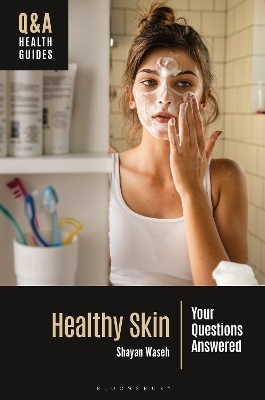
Healthy Skin
Bloomsbury Academic (Verlag)
978-1-4408-8039-1 (ISBN)
Part of the Q&A Health Guides series, this book offers a broad introduction to healthy skin – a topic that can have a tremendous impact on our physical and mental well-being. The book begins with questions covering the structure of skin, its many functions, how it repairs itself after damage, and how it changes as we age. Next, the book explores proper skincare, helping readers separate scientific fact from beauty industry hype. Readers will discover how to protect skin from UV damage, pollution, and other environmental hazards. Acne, rosacea, eczema, and other common dermatological conditions are also covered. The final group of questions examines the potential benefits and risks of a wide variety of cosmetic procedures, from chemical peels to injectable fillers.
Augmenting the main text, a collection of 5 case studies illustrate key concepts and issues through relatable stories and insightful recommendations. The Common Misconceptions section at the beginning of the volume dispels 5 long-standing and potentially dangerous myths about healthy skin, directing readers to additional information in the text. The glossary defines terms that may be unfamiliar to readers, while the directory of resources curates a list of the most useful books, websites, and other materials. Finally, whether they’re looking for more information about this subject or any other health-related topic, readers can turn to the Guide to Health Literacy section for practical tools and strategies for finding, evaluating, and using credible sources of health information both on and off the internet.
Shayan Waseh is a licensed resident physician specializing in the practice of dermatology at Temple University in Philadelphia, USA.
Series Foreword
Introduction
Guide to Health Literacy
Common Misconceptions about Healthy Skin
1. Healthy skin is a minor part of our overall health
2. There is a perfect skincare routine that works for everyone
3. Preventing skin aging requires expensive products and treatments
4. Higher SPF sunscreen is always better
5. People with dark skin don’t have to worry about skin cancer
Questions and Answers
The Fundamentals of Healthy Skin
1. What is the skin made of?
2. What are the most important functions of the skin?
3. What are some of the less commonly known functions of the skin?
4. What factors influence our skin’s health?
5. How does race and ethnicity affect skin?
6. How does the skin change as the body ages?
7. How does the skin heal and recover from damage?
Skincare Routines for Healthy Skin
8. What are the different forms of skincare products?
9. Does skin type affect which products we should use?
10. What is the best order to use skincare products in?
11. What is the ideal skincare routine?
12. Is wearing makeup bad for our skin?
13. Are more expensive skincare products always better?
14. What are the signs of sensitivity to a skincare product?
15. Which ingredients are best to avoid in skincare products?
Keeping Skin Safe
16. What are the different Fitzpatrick skin types?
17. What effect does sunlight have on the skin?
18. What are the signs of sun damage on the skin?
19. What is the best sunscreen to use?
20. Sun exposure may be harmful to skin, but don’t we need sunlight to produce adequate vitamin D?
21. What are the different types of skin cancer and how common are they?
22. What does skin cancer look like?
23. How often should we get skin exams?
24. How are skin cancers diagnosed and treated?
25. How do burns affect the skin?
26. Does pollution impact skin health?
Common Skin Conditions
27. What is acne and how is it treated?
28. What is eczema and how is it treated?
29. What is rosacea and how is it treated?
30. What is psoriasis and how is it treated?
31. What are the different kinds of contact dermatitis and how are they treated?
32. What skin conditions are caused by picking and scratching and how are they treated?
33. What are other common skin conditions and how are they treated?
34. What are the most common infections that affect the skin?
35. Can coronavirus cause changes in the skin?
36. Can medications affect the skin?
37. When is it appropriate to see a dermatologist rather than my primary care doctor?
38. What is the experience of getting a skin biopsy like?
Cosmetic Procedures
39. What causes the skin to age?
40. Is it possible to prevent or reverse skin aging?
41. How does Botox work?
42. What are fillers?
43. How do chemical peels affect the skin?
44. What is dermabrasion?
45. What is the best way to prevent scarring?
46. Why does skin become blotchy after skin conditions go away?
47. What treatments are available for treating skin blemishes?
48. How do laser treatments work?
49. How do I find a good cosmetic dermatologist?
50. Are there effective cosmetic treatments that can be done at home?
Case Studies
Case 1: Sarah Explores A New Skincare Routine
Case 2: Peter Finds A New Mole
Case 3: Jamal Gets Treatment For His Acne
Case 4: Emily Wants To Keep Her Skin Young
Case 5: Lily’s Strange Rash
Glossary
Directory of Resources
Index
About the Author
| Erscheinungsdatum | 24.09.2024 |
|---|---|
| Reihe/Serie | Q&A Health Guides |
| Verlagsort | London |
| Sprache | englisch |
| Maße | 156 x 235 mm |
| Themenwelt | Sachbuch/Ratgeber ► Gesundheit / Leben / Psychologie ► Schönheit / Kosmetik |
| Kinder- / Jugendbuch ► Sachbücher ► Körper / Sexualität | |
| Medizin / Pharmazie ► Medizinische Fachgebiete ► Dermatologie | |
| ISBN-10 | 1-4408-8039-5 / 1440880395 |
| ISBN-13 | 978-1-4408-8039-1 / 9781440880391 |
| Zustand | Neuware |
| Haben Sie eine Frage zum Produkt? |
aus dem Bereich


